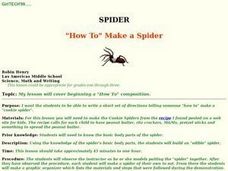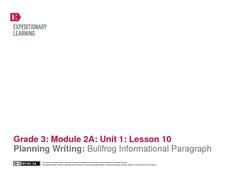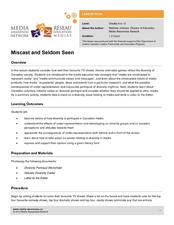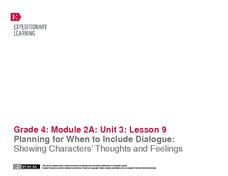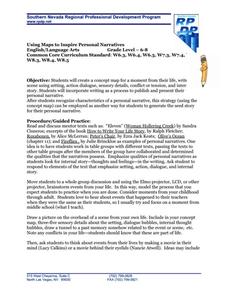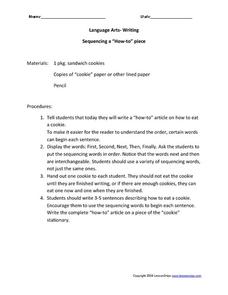Curated OER
Spider "How To" Make a Spider
Young chefs follow the set-by-step instructions of a recipe and use their prior knowledge of the body parts of a spider to make edible spider cookies. After completing a pre-writing graphic organizer they then write a "how to" paragraph...
EngageNY
Planning Writing: Bullfrog Information Paragraph
Lesson ten in this unit for the book Bullfrogs at Magnolia Circle, prepares third graders to begin writing an informational paragraph about the adaptations of bullfrogs. First, young writers work either independently or in pairs to...
Curated OER
Thanksgiving Writing Prompts to Kick-off the Holiday Season
Writing prompts, classroom warm-ups, and even research starters focused on the Thanksgiving holiday.
Turabian Teacher Collaborative
How to Find a Research Question
There are so many fascinating topics and concepts to learn about in the world. But where do you start? Begin formulating questions for an argumentative research paper with a guided practice lesson. After coming up with three questions...
Curated OER
How to Write a Biography
Looking for a great lesson on how to write a biography? Here, middle schoolers draw from magazine articles, novels, historical figures, and current events to choose a person, or character to write about in a biography. They follow a...
Curated OER
Borrowing Narrative Skills from Mr. Fletcher: Using a "Prompts in Reverse" Technique to Inspire Your Writers
Help your class find their writing voices with this lesson which uses the work of Ralph Fletcher to guide a "Prompt in Reverse" activity. Using the chapter "First Pen" from Fletcher's Marshfield Dreams, learners decipher what they...
Prestwick House
Writing Arguments in Response to Nonfiction
Emotional appeal or argument? That is the question. An informative activity helps your class recognize the difference between a logical argument and an emotional appeal and learn how to craft an argumentative response. Writers develop a...
Curated OER
The Lead Paragraph - How to Hook the Reader in 25 Words or Less
For this reading and writing analysis worksheet, students read a sample letter that hooks the readers. The students then discuss and adjust three other writing samples to make them more interesting.
The New York Times
Writing to Explain: Creating How-To Scripts and Demonstrations
Excuse me, can you give me directions? Scholars examine and practice technical writing to increase their ability to write directions. They participate in discussion, watch videos, and complete an assignment to create their own directions.
Curated OER
Miscast and Seldom Seen
Consider how well high schoolers' favorite TV shows, movies and video games reflect the diversity of society. The instructional activity introduces your class to several media literacy concepts, such as how media conveys values and...
EngageNY
Revising for Organization and Style: Bold Beginnings
Get young writers thinking about how to write a great beginning for their narratives. After examining examples of solid beginnings in literary text, young writers discuss the criteria for a compelling introduction. Then, independently,...
EngageNY
Writing Dialogue: Revising Historical Narrative Drafts to Add Dialogue
Young writers have written, revised, and peer-edited their historical fiction narratives by the 10th lesson plan in a language arts unit. Fourth graders finally combine their revision notes to create a second draft. The double-spaced...
EngageNY
Planning for When to Include Dialogue: Showing Characters’ Thoughts and Feelings
Young writers examine dialogue conventions, including indentation, quotation marks, and expressing thoughts and feelings through a fictional text. By noticing where and when authors use dialogue, they decide how to incorporate dialogue...
EngageNY
Revising for Organization: Timely Transitions
During the eighth lesson plan in a historical fiction unit, pupils practice thoughtfully transitioning their ideas sequentially. After the teacher models how to add these transitions using the Wheelwright draft created in a previous...
Curated OER
Peanut Butter and Jelly: The Importance of Detailed Procedures
Students write a list of steps to be taken in making a peanut butter and jelly sandwich. They observe as the instructor literally follows each step. After realizing the importance of clear communication, students write a scientific...
Curated OER
Writing a Screenplay
It's time to make a movie! Kids follow 15 steps to take their movie ideas from concept to script, following clear examples. The resource includes creative ways to guide learners into developing a few words and concepts into fully...
Southern Nevada Regional Professional Development Program
Using Maps to Inspire Personal Narratives
A solid description of one way to teach narrative writing, this resource outlines the writing process from concept to completion. Class members create concept maps of moments in their lives and follow the writing process to publish their...
Teachers.net
How to Write a Movie Review from a Pet's Perspective
When would two paws up denote a blockbuster film in your classroom? Only when young writers create movie reviews from a pet's perspective in this imaginative expository writing practice. This engaging topic begins with a class discussion...
Fluence Learning
Writing About Informational Text: Beyond the Beyond—Galaxies
Everyone has a different point of view, even when it comes to the enormity of the universe. Two separate text passages explain the scope of a galaxy, prompting young readers to write an essay about each author's argument and how the...
Curated OER
Sequencing a "How-to" Piece
In his sequencing worksheet, students write a "how to" article telling how to eat a cookie. In this essay worksheet, students write 3-5 sentences.
Southern Illinois University
I Can Write a Poem
It is so important for English language learners to be able to write for a variety of purposes. Specifically written for an ELD class, this activity provides explicit instruction for teaching learners how to write a poem. First, they...
Curated OER
"How To Build A Snowman" Expository Writing
Fourth graders write a "how to..." or an expository essay on building a snowman. They practice giving directions by explaining how to draw a person using shapes without mentioning that it's a person being drawn. They revise through the...
Curated OER
Writing Classroom Agreements using Inspiration & Word to Go
How can you foster a thoughtful learning community for your class? First, the class brainstorms a list of behaviors that will help make the classroom a great place to learn. Then learners group similar ideas together and come up with...
Curated OER
"I" Witness to History
Young journalists write diary entries from the point of view of a person involved in a historical event. They focus on including facts, clear narration, and accurate description of the individual's feelings.


